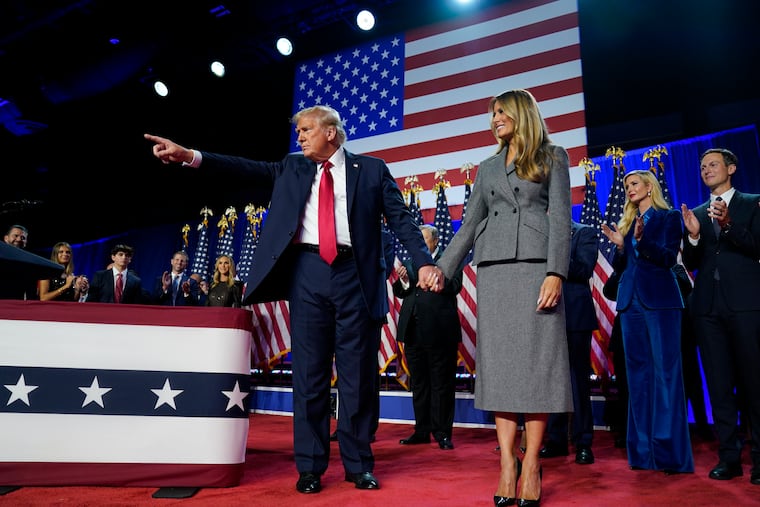Five of Donald Trump’s top campaign promises, explained
From mass deportations to new tariffs, Trump returns to the Oval Office with an aggressive and controversial agenda.

During his campaign, President-elect Donald Trump told Americans what to expect after he reenters the Oval Office in January.
It’s a broad agenda of economic, social, and personal priorities that he has proclaimed in rallies, interviews, and Truth Social posts. Trump will now try to wield what he has called an “unprecedented and powerful mandate” handed to him by voters to help him reach his goals.
From Trump’s long list, here are five promises he has pledged to keep.
1. Round up and deport undocumented immigrants
By far the most controversial of Trump’s ideas is to coordinate government agencies to help him locate and deport America’s estimated 11 million undocumented people — 3% of the U.S. population.
Trump will be ready to “institute the largest deportation operation in American history,” Trump campaign spokesperson Karoline Leavitt said in a statement.
To implement the plan, Trump said, he will rely on the Alien Enemies Act of 1798, which allows the president to detain or deport citizens of an “enemy nation” during wartime.
People would have to be detained before being exiled, Trump allies have said, which has set aggrieved immigrants rights activists in fighting stance.
But not everyone is upset.
Forbes reported that stocks of private U.S. prisons that would be used to house soon-to-be-deported people rose last week after Trump’s win.
2. Replace civil service employees with Trump partisans
In what could be the “most radical reconfiguration of the U.S. government in 140 years,” according to the Los Angeles Times, the incoming Trump administration may soon be poised to replace civil servants with Trump allies.
Of 2 million civilians working in the federal government, the Hill reported, many are “rogue bureaucrats,” in Trump’s parlance, dangerous members of the so-called deep state who plotted against him during his first administration.
Trump’s plan is to replace those federal workers with people who would comply with his thinking and conservative agenda.
Such efforts have been attempted in the past.
The “spoils system,” as it was called, was ended by Congress in the late 19th century because the political cronies who sat at desks previously occupied by more knowledgeable workers were found to be incompetent.
3. Make sure tax cuts are retained
The tax cuts implemented in 2017 during Trump’s first term in office are set to expire in 2025. Trump has said he won’t let that happen.
During the campaign, Trump talked a good deal about retaining the cuts and finding even more. He promised to eliminate taxes on tips, Social Security benefits, and overtime pay. He also mentioned ending the federal income tax altogether.
Trump spoke last month with a New York City barber who told of being saddled with a $15,000 electric bill. That proved to be a utility company error, but it inspired Trump to say, “We have income taxes, and we have people that are dying. They’re paying tax, and they don’t have the money to pay the tax.”
The earlier Trump tax cuts overwhelmingly benefited the nation’s highest earners, according to the Urban-Brookings Tax Policy Center.
If the law’s provisions are made permanent, households making at least around $450,000 — roughly the top 5% — would be the biggest winners, according to CNN. They would see their after-tax income increase by 3.2%.
4. Impose tariffs — huge tariffs
“Tariffs are the greatest thing ever invented,” Trump said during a Michigan campaign swing in September.
He said these taxes that are placed on goods that cross national borders have inordinate powers to decrease the federal debt, lower food prices, get more factory jobs going, and even allow the government to subsidize childcare.
Tariffs, Trump concluded, can even promote world peace.
While campaigning for president, Trump said he would impose a 60% tariff on products from China, America’s leading foreign supplier, and other tariffs as high as 20% on all U.S. imports.
Retailers and economists say tariffs will hurt U.S. consumers.
“You will pay for Trump’s tariffs,” a CNN headline from Wednesday reads.
Philip Daniele, CEO of AutoZone, made a tariffs-related promise of his own during an earnings call in September: “If we get tariffs, we will pass those costs back to the consumer.”
5. Punish his enemies
It’s not certain what Trump will do as the 47th president to those who have opposed and spoken out against him.
But what is known is what he has said should be done.
Vice President Kamala Harris “should be impeached and prosecuted,” Trump said at a rally last month.
“I will appoint a real special prosecutor to go after the most corrupt president in the history of the United States of America, Joe Biden, and the entire Biden crime family,” Trump said last year.
On his Truth Social platform, he has on multiple occasions vowed to seek “retribution” and called longtime critic Rep. Adam Schiff (D., Calif.) “the enemy from within,” more dangerous than any foreign adversary.
During an interview with TV personality Dr. Phil in June, Trump said: “Well, revenge does take time. I will say that. And sometimes revenge can be justified.”
Since 2022 when he began preparing for the presidential campaign, NPR reported, Trump has issued more than 100 threats to investigate, prosecute, imprison, or otherwise punish his perceived opponents.
Trump famously said last year that if elected, he would be a dictator for that day only, so he can close the border and “drill, drill, drill,” presumably for oil.
“After that,” he continued, “I’m not a dictator.”